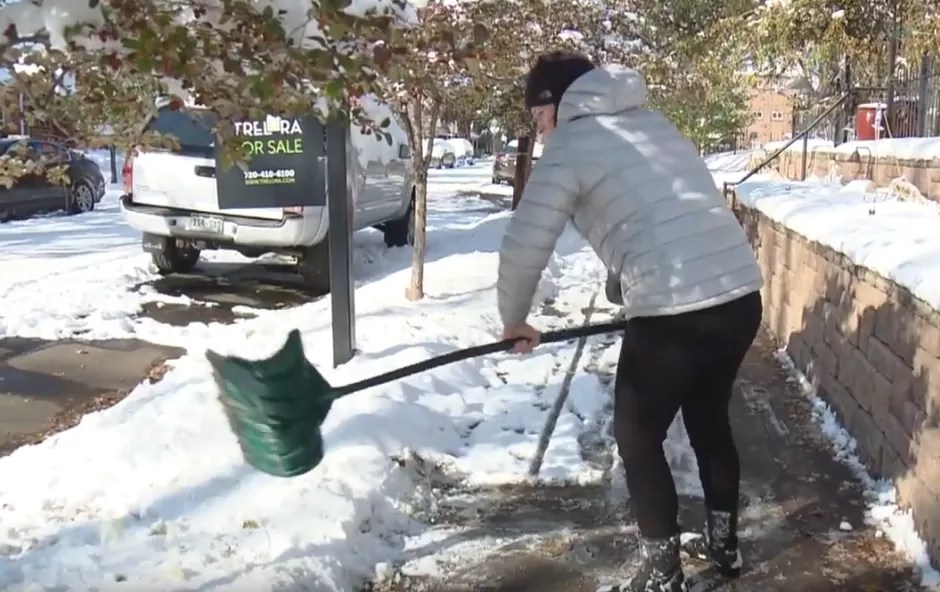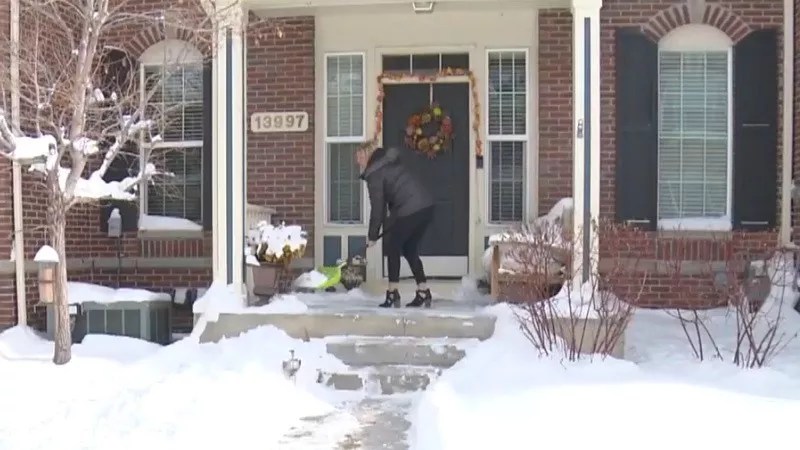
CBS4 via YouTube

Audio By Carbonatix
More than a week after a huge, pre-Thanksgiving storm dropped snow measured in feet on some parts of the greater metro area, the city of Denver is still dealing with the system’s repercussions. Impacts include icy and snowy sidewalks bordering businesses and residences that could draw fines even as many side streets remain so treacherous that Denver Public Works decided to spread de-icer on them for the first time ever despite serious doubts that it would do any good.
Given predictions of more precipitation today, December 5 – albeit much less than last time around – what are the odds that you’ll be punished for failing to clear walkways that may be as frozen and crusty as Ted Williams’s cryogenically preserved head? To answer that question, and many others, we reached out to Laura Swartz, spokesperson for Denver Community Planning and Development (DCPD), the agency tasked with enforcing rules in regard to sidewalks and much more.
Among other things, Swartz reveals that eight properties were fined over a four-day period after the storm: Wednesday, November 27, Friday, November 29, Monday, December 2, and Tuesday, December 3. (No inspections were conducted on November 28, Thanksgiving Day.) Four of the targets were residences in the Washington Park area, while the other four represented businesses – a public storage facility on Hampden, a gas station on Federal, a shopping center on Colfax and an industrial property on Huron near Coors Field.
Still, the eight fines represent a tiny percentage of the department’s overall efforts. Over the aforementioned four-day span, Swartz says, “we went out on 506 inspections. Inspectors have been working overtime – as long as there’s still light. But we have over 1,000 still to get to.”
One reason for the backlog is a lack of human resources. According to Swartz, DCPD usually has about twenty staffers available to do inspections, but because of some recent retirements and the like, only fourteen people are currently doing the job. Five new hires are expected to come aboard during the next week and a half or so, and the department is looking for more folks to join their ranks. (Click to see the zoning-and-neighborhood-inspections job posting.) Until then, some staffers who typically inspect construction properties, as well as workers with Denver’s Office of Emergency Management, have been chipping in.
The zoning and neighborhood inspection team isn’t seasonal, Swartz stresses. “They’re charged with enforcing the Denver Zoning Code and pieces of the Denver Revised Municipal Code that relate to property maintenance, and they work year-round. When there’s construction going on, they check to make sure it’s the right distance from the street and neighboring properties. They also look to see if vegetation is overgrown and blocking the sidewalk, if there’s junk outside, like an abandoned vehicle on the front lawn. But during the winter, they make sure the sidewalks are clear and free of snow and ice as the city’s arm for snow enforcement.”
Inspectors analyze businesses proactively and respond to residences if a complaint is filed, she notes – “and they can go out as soon as it stops snowing. Commercial properties need to get the snow cleared within four hours, and residential properties have 24 hours.”

A metro-area homeowner clearing snow after the pre-Thanksgiving storm.
CBS4 via YouTube
This deadline isn’t as hard and fast as it may seem, Swartz maintains. “When our inspectors go out, the first visit is a warning. Our goal is never to fine anyone. It’s to say, ‘Hey, did you know you’re responsible for clearing the snow?’ Then we apply that same 24-hour threshold for rechecking.”
If the situation remains problematic the next day, individuals could receive a fine of $150, with the amount rising to $500 and $999 for second and third offenses, respectively. But “what happens in reality will vary by property,” she explains. “Our first question is, ‘Why didn’t it get shoveled? Is the person not capable of shoveling? Did they shovel half of it, but not the other half? And can we talk to the person, educate them and get the snow removed?'”
For instance, she goes on, residents on corner lots “don’t just need to shovel the sidewalk. They also need to clear the wheelchair ramp down to the street, because people need to use that to access the sidewalk. Some people don’t know they’re supposed to do that, so we let them know.”
What about those who don’t follow through? “If we’ve talked to them on the recheck and they still didn’t do it, then they could be fined,” Swartz replies. “But we wouldn’t do that without figuring out what’s going on.”
For folks who are physically incapable of shoveling snow, there are options. Swartz points to a city program called Snow Angels, “where we help connect residents who need help with other residents who volunteer to help shovel.” She also touts efforts by other agencies and nonprofits that may be able to help. The contact information for several is available at the bottom of this post.
On occasion, inspectors have been known to pitch in with shoveling, too, Swartz divulges, “but probably not right now, because they’re overwhelmed with the number of inspections they’re doing.”
In general, she says, “there’s a lot more leeway in the conversation for homeowners than for businesses – especially commercial properties along major thoroughfares, where there’s a lot of pedestrian activity, like Colfax, Hampden and Federal. For them, we do a lot of proactive messaging, reminding them that they need to have a snow plan and have to shovel early and often, because that prevents ice from forming. There’s less leniency with them, because every time it snows, they’re aware of their responsibility. We’ve already had several snows this year, and they should know by now there’s a way to prevent ice from forming on the sidewalk.”
These conversations aren’t meant to be adversarial, Swartz allows. “Our inspectors have great relationships. They go to neighborhood meetings, where they talk about these issues, and when they go on calls, a lot of people will come out and say, ‘Thank you.’ They have a really good rapport with the neighborhoods.”
She says this kind of communication can go a long way toward preventing problems. “As much as possible, we ask people to be good neighbors and talk to each other. A lot of people still don’t realize they’re responsible for the sidewalks, and having that conversation can resolve things much faster than waiting for our inspectors to go through 1,000 inspections and get out there.”
Here’s the link for Denver’s Snow Angels program. Other help with sidewalk shoveling and related issues may be provided by Catholic Charities of Denver (303-742-0828), the Denver Regional Council of Governments’ Area Agency on Aging (303-480-6700), the Seniors’ Resource Center (303-238-8151) and the Volunteers of America Handyman program (303-297-0408).